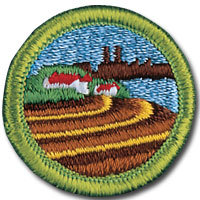 Click here for the official guidelines from the Boy Scouts of America for the Soil and Water Conservation Merit Badge.
Click here for the official guidelines from the Boy Scouts of America for the Soil and Water Conservation Merit Badge.
Soil and water are crucial to any gardening or farming endeavor, as well as to nature. If you are building a self-watering container garden, researching soil types to find the right mix for your plants and containers is very important.
Equally important is understanding how to keep your soil full of the nutrients necessary to promote plant growth, which is required for this badge. This badge also requires you to make a drawing of the hydrologic cycle. This is part of the dynamic that makes your self-watering bucket containers self-watering. You can see a simple diagram of the process by clicking here and scrolling to the bottom of the page.
This badge gives you the option to plant 100 trees, bushes, and/or vines for a good purpose. Certainly, growing food-bearing bushes and vines in self-watering bucket containers for your family, community, school, or another group of individuals would meet this requirement. You could even distribute your 100 plants across several container gardens, if you are supporting more than one.
Keep in mind that you can fit up to five bush green bean plants in a single self-watering bucket container, which means that you could accommodate 100 green bean plants with 20 self-watering bucket containers. Where you can consolidate to conserve on materials, please do.
This badge gives you the option to carry out any other soil and water conservation project that meets with your Badge Counselor’s approval. Consider that a self-watering container garden is, itself, soil and water conservation project. The reservoir holds only about one to one-and-a-half gallons of water when full and it takes a long time before more water has to be added. The water usage for a self-watering container garden is quite conservative.
Additionally, by making your own compost, you can supplement the soil with each change in growing season and rotate different crops through the different containers so as not to exhaust the soil with the same plant type over and over.
Regular fertilizing is helpful to preserve soil quality, as well as the addition of earthworms to the soil in your containers. Earthworms aerate the soil, which is beneficial for plant roots, and produce worm castings (poop) that fertilizes the soil further. By using techniques like these, you can preserve your soil quality and reuse the same soil from season to season, which conserves the amount of soil being taken from nature for gardening projects such as yours.
Return to Boy Scouts Page
